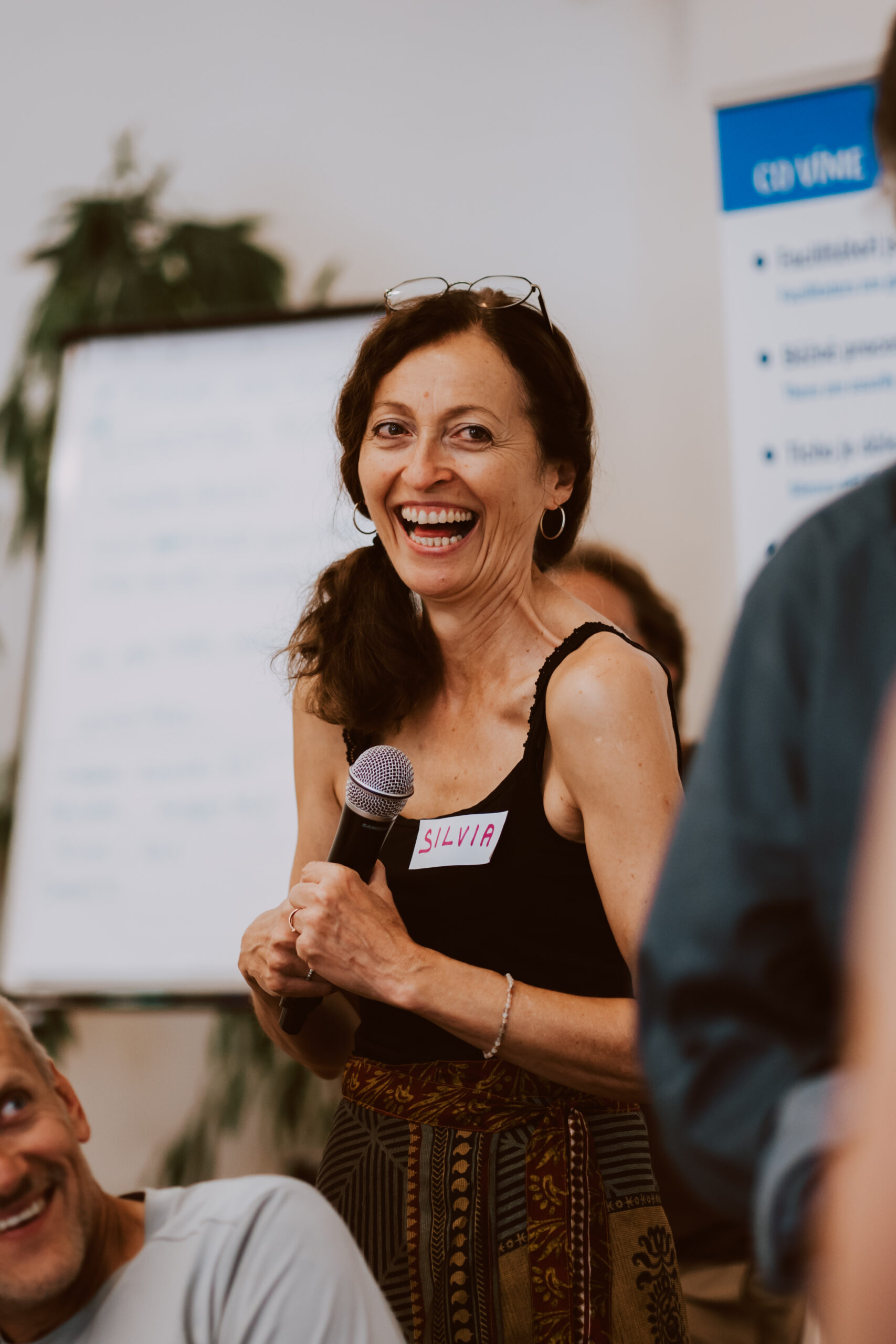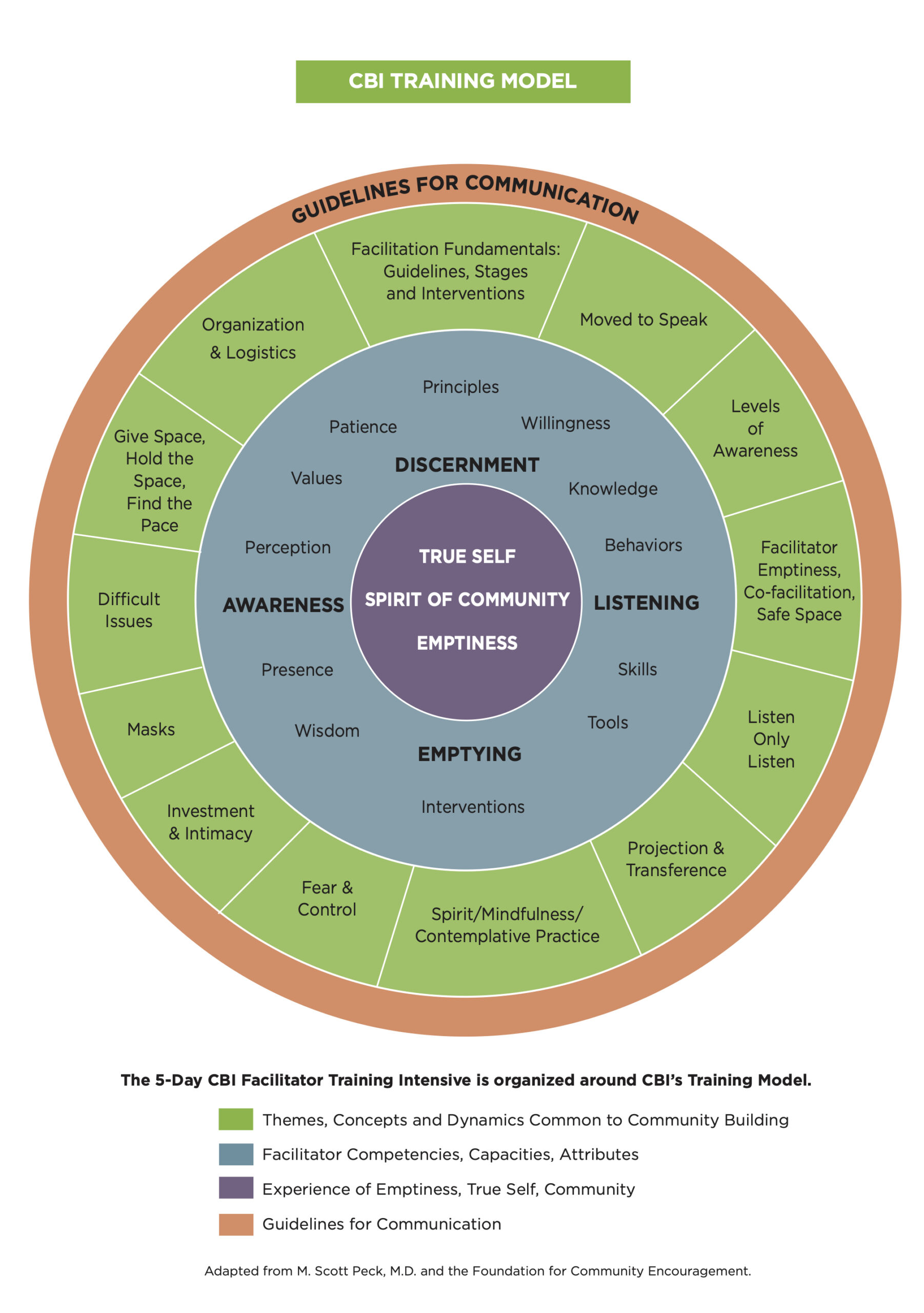Facilitator Training, Certification and Licensing
CBI was founded in part to provide professional CB Facilitator Training and ensure the highest standards and quality in Community Building facilitation. We are committed to preserving and protecting the original principles and methods developed by renowned author and teacher M. Scott Peck M.D.
CBI is the only professional Community Building training and certification organization in the world – and employs rigorous, high-quality training, mentoring, and standards of excellence.
CBI provides training and licensing to a broad range of individuals and organizations including:
- Business coaches and consultants
- Government, nonprofit, human service, criminal justice providers and officials
- Individual seekers and community builders
- Members of intentional communities
- Members of religious communities
We offer public trainings and “in-house”training, certification and licensing.
The first step to becoming a facilitator is to attend the Community Building Workshop (CBW) Classic and/or The Art of Connection: Community Building Skills Training (CBST).
To learn more about Facilitator training for you individually or your organization, please contact us.

About the Training
Purpose
The purpose of the Facilitator Training and Certification Program is to:
- Equip participants with the knowledge, skills, tools, wisdom and experience to effectively facilitate Community Building Workshops (CBWs), Community Building Skills Trainings (CBSTs), and other specially designed Community Building sessions and experiences (CBEs).
- Provide an opportunity for personal and spiritual healing, personal and professional growth and development (even if you do not desire to be a facilitator).
Training Phases
The Facilitator Training Program consists of three overlapping phases:
- THEORY & PRACTICE: Modules I, II, III, IV, Advanced Module
- BEING ON TEAM: Observation, Co-facilitation
- DEVELOPMENT & CERTIFICATION: Coaching and Mentoring, Personal Development Plan, Practicum Project, Evaluation and Certification
The key factor to successful facilitator development is the combination of in-person/online classroom training and live, real-time CBW/CBST facilitator team-shadowing, co-facilitation, coaching and mentoring.

Facilitator Certification Levels & Requirements
1. Facilitator in Training (FIT) – eligible to be on team with Sr. Facilitator or higher.
2. Facilitator – certified to facilitate with another Level 2 or higher.
3. Senior Facilitator – certified to facilitate and mentor Level 1 and 2s.
4. Trainer – certified to co-facilitate modules with CBI staff.
To view specific information for a level, click the + icon to the right of the level names below.
1. Facilitator in Training (FIT)
Eligible to shadow/be on CBW/CBST facilitator team with CBI Senior facilitator, attend modules, webinars and advanced trainings. May present self as CBI Facilitator in Training. May not present self as CBI certified, licensed facilitator.
Requirements to be FIT level:
- Complete Application for Facilitator Training Program.
2. Participate in one CBW or one CBST before participating in Module 1.
3. Maintain active/current CBI Facilitator Membership.
4. Sign facilitator licensing, membership, and training program (if applicable) agreements. 5. Demonstrated ability to engage and participate in a CBW/CBST.
6. Commit to support CBI mission, vision, values, policies and agreements.
7. CBI acceptance of application
Recommended:
- Attend 1-2 CBWs AND CBSTs before module 1.
2. Attend one global circle before attending module 1.
2. Facilitator
Certified/Licensed to co-facilitate CBWs and/or CBSTs with a fellow certified CBI Facilitator or certified CBI Senior Facilitator. May not co-facilitate with FITs unless Senior Facilitator is on the facilitator team. May present and market self as certified, licensed CBI facilitator with active CBI membership. CBST certification and CBW certification are separate.
Requirements to be Facilitator level:
- Meet all FIT requirements.
- Sign upgraded CBI licensing and membership agreements.
- Attend Modules 1-4.
- Complete Self-Assessment & Complete 2 Coaching Sessions with Trainer/Sr. Facilitator.
- Be a participant in 2 CBWs.
- Be a participant in 2 CBSTs online or in-person.
- Be on Team at a CBW at least 3 or more times as shadow/co-facilitator with CBI Trainer/Senior Facilitator for CBW certification.
- Be on Team at a CBST 3 or more times with CBI Trainer/Senior Facilitator for CBST certification.
- Complete a Practicum project, i.e. organize or co-organize a CBW or CBST with CBI Trainer, Sr. Facilitator.
- Complete 3 coaching sessions, complete the Self-Assessment, and create a personal development plan.
- Successfully implement the personal development plan in collaboration with your assigned Coach.
- Complete and pass CBI’s written test for Facilitator Level certification.
- Attend CBI Facilitator webinar on CBI Facilitation Protocol and Quality Standards.
- Attend CBI Facilitator webinar on CBI Policies and Operating Agreements.
- Attend 1 CBI Facilitator Advanced Training.
- Demonstrate the knowledge, skills, attributes, characteristics, abilities to effectively:
- Risk, Empty, be vulnerable.
- Ask for help, Identify and deal with difficult issues and elephants, show a sense of humor, display empathy, self-regulate.
- Practice all of the Guidelines for communication, especially use of 100% “I” statements, Listen Only Listen, Moved to Speak, and Give Space, Hold Space, Find the Pace.
- Conduct all aspects of the CBW/CBST Introduction.
- Diagnose group stages, signs and indicators, and key transition times.
- Discern individual participant use or lack of use of guidelines.
- Recognize the “key factors” that determine why, what, how and when to intervene: group stage, time segment, guidelines being used/not used, unique dynamics, etc.
- Read the story and begin the CBW.
- Call breaks.
- End the workshop day.
- Make interventions, offer insights, observations and comments to group using CBI’s How to Say Things and Facilitation Protocols and Standards manual as a guide.
- Coach individual participants during CBW/CBST as needed.
- Be an engaged, supportive facilitator team member. Be an effective team lead.
- Lead and manage a huddle.
- Give and receive feedback and support to/from co-facilitator(s).
- Deliver all CBST presentations, and exercises.
- Facilitate CBST debriefs after each exercise.
- Modify CBST schedule before and during live CBST.
- Deliver CBST bonus exercises.
- Lead a CBW or CBST pre-workshop meeting.
- Effectively communicate with workshop organizer(s), volunteers and site contacts.
- Plan and handle pre-workshop and onsite CBW and CBST logistics, procedures & protocols: preworkshop emails/handouts, room set-up, registration, interest forms, etc.
Recommended:
- Attend webinars.
- Be on team for CBWs and CBSTs 3 additional times or more.
- Be a participant at CBWs and CBSTs 5 additional times or more.
- Facilitate in other countries.
- Attend a one-day CBST.
- Attend 3 global circles, or more.
- Co-facilitate a global circle with a sr. facilitator.
- Conduct a CBST/CBW taster.
- Be on team for a Module or Advanced Training.
- Retake Module 1.
- Retake Module 2.
- Organize additional workshops.
- Attend the CBI Facilitator Annual Meeting.
- Memorize How to Say Things.
- Read the CBI Facilitation Protocol and Quality Standards handbook.
- Read the CBI Policies and Operating Agreements handbook.
- Participate in opportunities to visit and facilitate in USA CBWs and CBSTs with different audiences.
3. Senior Facilitator
Certified to mentor FITs and other facilitator colleagues.
Requirements to be Senior Facilitator level:
- Role Model, Advocate and Champion for CBI organization, mission, values, vision, goals, plans, facilitation standards, policies & procedures.
- Meet all FIT and Facilitator requirements.
- Complete upgraded license and membership agreement.
- Attend Senior Facilitator Training.
- Attend Annual Meeting (every 2 years).
- Facilitate skills & tasks listed in the CBI Self-Assessment.
- Coach, mentor and be role model for FITs and Facilitator colleagues.
- Be a Champion for CBI Network mission-vision-organization.
- Be a Champion for CBI standards, protocols and agreements.
- Role model CBW and CBST interventions.
- Effectively Lead team huddles. Mentor others in how to lead team huddles.
- Able to identify and deal with difficult issues in workshop and within facilitator team.
- Able to give timely constructive feedback to FITs and Facilitator colleagues.
- Attend annual meeting (online or in-person if in your continent) at least once every two years.
- Attend special Sr. Facilitator trainings, and adhoc Sr. Facilitator meetings as needed.
- Complete annual assessment and development/planning/coaching session with Edward.
- Lead or participate in CBI planning and special topic teams.
- Works effectively on facilitator teams for modules and advanced trainings.
- NOTE: Senior Facilitator with backup.
- Able to deliver CB introductory talks.
4. Trainer
Able to deliver Facilitator Training modules. Able to work with certain unique participant groups (ex. Youth, ex-offenders, government programs). Certified to mentor all levels: FIT, Facilitator, Sr. Facilitator. Able to design unique trainings and presentations to meet unique client needs. Competent in all areas of consulting skills. Role model and champion for CBI Network values and vision.
Additional Facilitator Certification Details
- Facilitators in Training (FITs) participate in the CBI 2/3 Year Facilitator Training Program (FTP) which includes CBI Membership and a CBI license agreement granting the right to market & use CBI CBST & CBW materials once certification is achieved.
- CBW and CBST certifications are separate.
- FITS and Facilitators attend modules and are on team for CBWs and CBSTs.
- CBI Webinars are held to provide updated information and answer questions about CBI
- policies and agreements, CBI facilitation protocols and standards, licensing agreements, facilitation opportunities, and facilitator assessment and advancement process.
- Attendance at a webinar on CBI protocols & procedures, policies & agreements is required.
- FITS and Facilitators are observed, assessed and coached and assessed by Senior Facilitators
- during modules, webinars, coaching sessions and being on team.
- Facilitator certification is determined by CBI staff and the Standards, Protocols & Certification
- Team (SPC Team). The SPC Team consists of CBI certified Sr. Facilitators and CBI staff. The SPC team meets throughout the year to assess and track facilitator development and progress – and determine Facilitator Level of Certification (FIT, Facilitator, Senior Facilitator or Trainer). CBI Staff and the SPC team use the Facilitator Self- Assessment and the Facilitator Certification Levels and Requirements (see below) as criteria for facilitator advancement. CBI Staff and the SPC Team includes past experience when determining facilitator levels.
- Levels of certification are formally communicated to FITs and Facilitators (with Active CBI Membership) annually by email and/or in individual coaching sessions with a CBI Sr. Facilitator.
- Once certification is achieved, individuals receive and updated license agreement to protect their right to use CBI materials and protect quality standards.
- Facilitator certifications may include a “With Backup” designation. “With Backup” means that a facilitator is required to arrange scheduled telephone support with a Sr. Facilitator before, during and after a CBW/CBST.
2-Year Facilitator Training & Certification Program Costs
The entire 2-year Facilitator Training & Certification Program costs 4900€.
Payment plans, scholarships, work exchange available. Community Building International is committed to providing training to all individuals with sincere interest and commitment to spreading the experience and vision of peace and Community.


